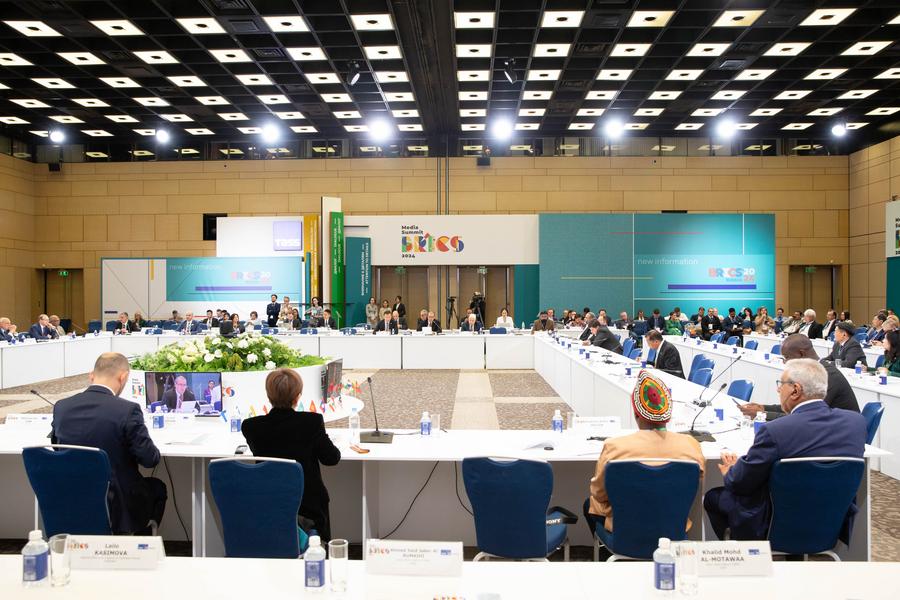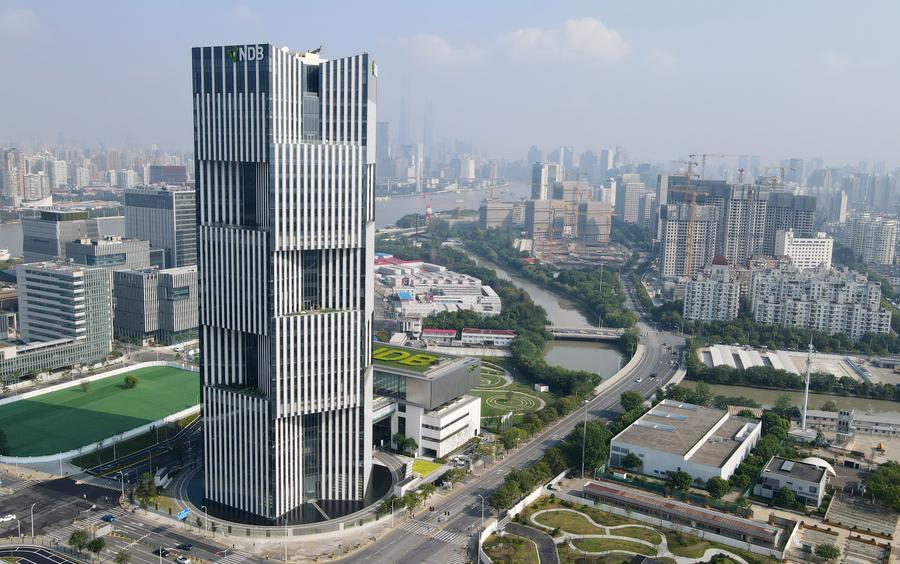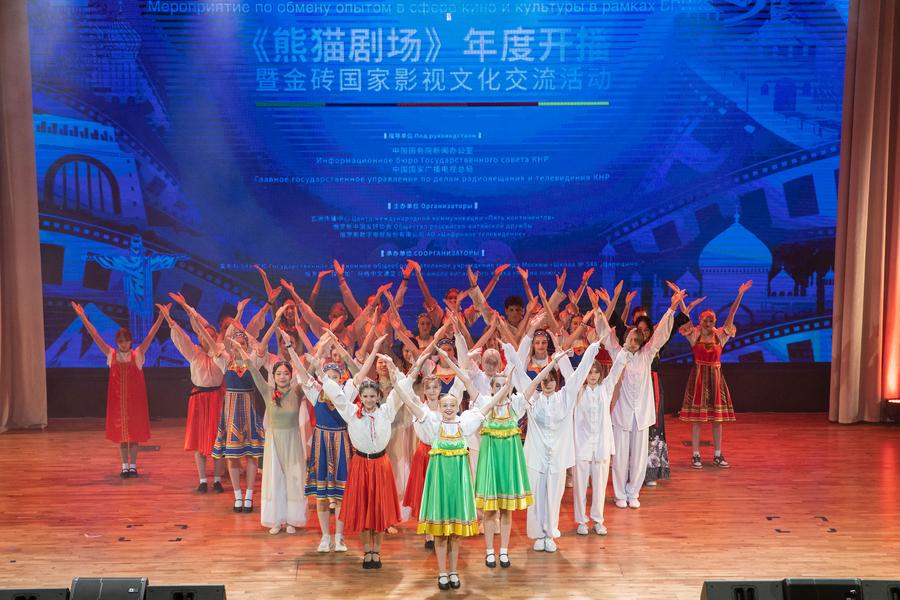

During the upcoming BRICS summit, the first such gathering to be held after the BRICS expansion, Chinese President Xi Jinping and leaders of other BRICS countries are expected to draw a blueprint for the development of its mechanism, inject new impetus into a multipolar world, facilitate economic globalization and democratization of international relations, and open up a new chapter for the solidarity and development of the Global South.
BEIJING, Oct. 21 (Xinhua) -- Chinese President Xi Jinping will attend the 16th BRICS Summit on Oct. 22-24 in the Russian city of Kazan at the invitation of Russian President Vladimir Putin.
BRICS is an acronym for Brazil, Russia, India, China, and South Africa, five major emerging markets with considerable economic potential. It has now evolved into an influential international cooperation mechanism with an expanded membership.
Over the past 18 years, China has upheld the BRICS spirit of openness, inclusiveness, and win-win cooperation and helped drive the BRICS cooperation mechanism to a new level, serving as a constructive force for safeguarding world peace, promoting common development, improving global governance and facilitating democratization of international relations.
This year marks the beginning of greater BRICS cooperation. During the upcoming summit, the first such gathering to be held after the BRICS expansion, Xi and leaders of other BRICS countries are expected to draw a blueprint for the development of its mechanism, inject new impetus into a multipolar world, facilitate economic globalization and democratization of international relations, and open up a new chapter for the solidarity and development of the Global South.

This photo shows a view of the Kazan Kremlin in Kazan, Russia, Oct. 20, 2024. (Xinhua/Ding Haitao)
NEW STARTING POINT
"BRICS is an important force in shaping the international landscape. We choose our development paths independently, jointly defend our right to development, and march in tandem toward modernization. This represents the direction of the advancement of human society, and will profoundly impact the development process of the world," said Xi during the 15th BRICS Summit in August 2023.
Other than the countries that officially joined the BRICS family on Jan. 1, 2024, over 30 countries like Thailand, Malaysia, Türkiye and Azerbaijan have either formally applied for or expressed interest in its membership.
After the expansion, the BRICS countries account for about 30 percent of the global GDP, nearly half of the global population and one-fifth of global trade.
China has been committed to deepening mutually beneficial cooperation with its BRICS partners. In the first quarter of this year, China's imports and exports to BRICS countries increased by more than 11 percent year on year.
Ahmed Al-Ali, a researcher based in Dubai, the United Arab Emirates (UAE), said that the BRICS has become an important engine to drive global economic recovery and maintain world peace and stability thanks to its steady economic growth, and equal and extensive cooperation opportunities.
"Ethiopia's BRICS membership could significantly boost the country's socio-economic development through various economic opportunities, including increased investment, expanded South-South cooperation and trade partnerships," said Balew Demissie, a researcher at the Policy Studies Institute of Ethiopia.
China's cooperation with other BRICS members has strongly defended multilateralism and promoted the democratization of international relations, said Evandro Carvalho, a Brazilian professor at the Getulio Vargas Foundation, an economic think tank.

The BRICS Media Summit is held in Moscow, Russia, Sept. 14, 2024. (Xinhua/Bai Xueqi)
The appeal of the BRICS cooperation mechanism comes from its spirit of openness, inclusiveness, and win-win cooperation. "BRICS countries gather not in a closed club or an exclusive circle, but a big family of mutual support and a partnership for win-win cooperation," Xi said during the 14th BRICS Summit in June 2022.
From the "BRICS Plus" cooperation approach proposed in 2017 to the historic expansion of BRICS membership, the mechanism is widely welcomed, with growing influence and appeal.
The BRICS cooperation mechanism respects the interests of all parties involved and is an "attractive platform for cooperation and mutual benefit," said Elshad Mammadov, an Azerbaijani economics expert.
FRUITFUL ACHIEVEMENTS
At present, the mechanism is at a crucial stage of building on past achievements and ushering in a new era of cooperation. China is working with other BRICS partners, embarking on a new journey of greater BRICS cooperation.
"We should navigate the trend of our times and stay in the forefront. We should always bear in mind our founding purpose of strengthening ourselves through unity, enhance cooperation across the board, and build a high-quality partnership. We should help reform global governance to make it more just and equitable, and bring to the world more certainty, stability and positive energy," Xi has said.
Applauding more participants and exploring new ways of cooperation within the mechanism, the BRICS countries will also have more opportunities and their roles in the global arena will continue to expand, said Ivan Melnikov, first vice-chairman of the Russian State Duma and chairman of the Russia-China Friendship Association.
China and its BRICS partners have worked together to advance practical cooperation and deepen mutual benefit, setting up projects such as the China-BRICS Science and Innovation Incubation Park for the New Era and the China-BRICS AI Development and Cooperation Center, as well as hosting the BRICS Forum on Partnership on New Industrial Revolution and BRICS Industrial Innovation Contest.

An aerial drone photo taken on Sept. 28, 2021 shows the headquarters building of New Development Bank (NDB) in east China's Shanghai. (Xinhua/Fang Zhe)
Set up by the BRICS and opened in 2015, the New Development Bank (NDB) aims to mobilize resources for infrastructure and sustainable development projects in BRICS and other emerging market economies and developing countries.
Meanwhile, people-to-people and cultural exchanges among BRICS countries are in full swing with popular events such as film festivals, sports games, and co-productions of films and documentaries.
The first special session for BRICS countries of the International Youth Poetry Festival kicked off in the Southeastern Chinese city of Hangzhou in July, attracting 72 poets from BRICS countries.
In mid-September, over 60 media leaders from more than 40 countries joined the BRICS Media Summit in Moscow, discussing the role of BRICS media in promoting a multipolar world.
People-to-people exchanges have deepened among BRICS countries, and BRICS member states have worked towards a closer friendship, providing a "BRICS model" for promoting exchanges and mutual learning among civilizations, said Ahmed Hamadi, a political commentator of the Aletihad News Center of the UAE.

Young Chinese and Russians perform on stage in Moscow, Russia, Sept. 22, 2024. (Xinhua/Bai Xueqi)
BRIGHT FUTURE
Thanks to the concerted efforts of all parties, the BRICS has increasingly become an important force in shaping the international landscape and safeguarding global stability.
The BRICS cooperation mechanism is now a key venue for emerging markets and developing countries to strengthen solidarity and cooperation and safeguard common interests, thereby serving as the most pivotal mechanism representing the Global South.
China is a significant promoter of BRICS cooperation and a natural member of the Global South. Beijing has all along stood with other developing countries through thick and thin. While pursuing its own development, China has continuously provided new opportunities for the rest of the world by sharing its development dividends.

A model of E190-E2 aircraft is on display at the exhibition of BRICS New Industrial Revolution 2024 in Xiamen, southeast China's Fujian Province, Sept. 10, 2024. (Xinhua/Lin Shanchuan)
"China's role in promoting the continuous development of BRICS is significant," said Zukiswa Roboji, a researcher at Walter Sisulu University in South Africa.
The BRICS mechanism effectively promotes solidarity and cooperation among countries of the Global South, and enhances the representation of developing countries in global governance, and China has made positive contributions to raising the global influence of BRICS cooperation, Roboji said.
The genuine multilateralism advocated by China and its efforts in promoting the modernization of the Global South have brought confidence and important strength to the world, said Bunn Nagara, director and senior fellow at Belt and Road Initiative Caucus for Asia-Pacific.
"Today, China is exactly what the countries of the Global South want to be," said Dilma Rousseff, former Brazilian president and president of the NDB, adding that China's advocacy of more just and effective global governance is helping the world build a bright shared future.
(Video reporters: Ma Zheng, Zheng Kaijun, Zhou Nan, Wang Lu, Guo Peiran, You Zhixin, Zhou Tianhe, Zhao Yan, Sun Hao, Meng Jing, Zhao Yihe; Video editors: Ni Siyi, Shang Jun, Wang Lu, Xu Haijing, Zheng Kaijun)■
点击右上角![]() 微信好友
微信好友
 朋友圈
朋友圈

请使用浏览器分享功能进行分享
